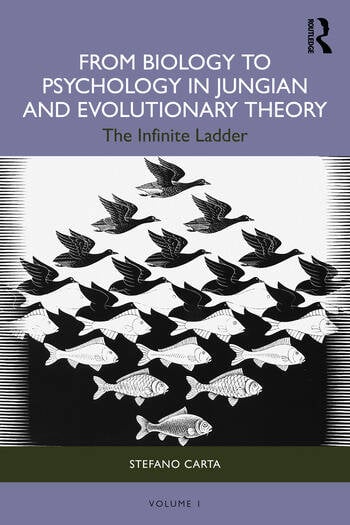From Biology to Psychology in Jungian and Evolutionary Theory: The Infinite Ladder

Book Details
- Publisher : Routledge
- Published : 2025
- Cover : Paperback
- Pages : 244
- Category :
Jung and Analytical Psychology - Catalogue No : 98144
- ISBN 13 : 9781032957296
- ISBN 10 : 1032957298
Reviews and Endorsements
Stefano Carta is a truly original and deep thinker, and with his personal and well-researched approach he conveys an inspiring and valuable contribution to the continuing contemporary discussion of Jung's thought. Stefano Carta deserves great credit for this impressive work that will undoubtedly stand as a milestone in Jungian literature for many years to come.
Misser Berg, Jungian Analyst, President of the International Association of Analytical Psychology
The extraordinary breadth and scope of Stefano Carta's two volume set The Infinite Ladder is a boon to scholars of Analytical Psychology. The careful synthesis of essential Jungian concepts spanning an enormous range from biological to cultural considerations within a psychological perspective, integrated into a contemporary multidisciplinary framework is a rare achievement as well as a gift to the field. Together these volumes will also serve as a very valuable hub in guiding researchers who explore the interconnectedness of Analytical Psychology with the most advanced contemporary thought in numerous related fields.
Joseph Cambray, PhD, IAAP, Past-President and CEO, Pacifica Graduate Institute
Stefano Carta's two volumes are a courageous attempt to reassert the importance and validity of C.G. Jung's fundamental ideas on the central role of emotions, archetypes and the Self within an evolutionary framework. Employing the compelling metaphor of the infinite ladder, Carta demonstrates how psychology reveals its transformative function of the biological foundations of life into the cultural realm. His books, firmly rooted in cutting-edge research, are indeed a unique, fascinating and challenging contribution that will bring the reader to new heights of understanding.
Carolyn M. Bates, PhD, North American Co-Editor in Chief for the Journal of Analytical Psychology
These two volumes are the fruit of a lifelong exploration of Jungian psychology in a contemporary scientific environment. Some of C. G Jung's important ideas are scrutinized in terms of their connectivity to today's scientific thinking. Questions that Jung was already pondering are placed in a new, contemporary context. “What has not been appreciated enough in the past in Jung’s theories and yet could be connected to today's ideas?” To answer this question, the author takes the reader on a stimulating, thoughtful and thought-provoking intellectual journey.
Verena Kast, Jungian Psychoanalyst and former professor at the University of Zurich
This is an exciting book the likes of which I have been waiting for. It is far-reaching and comprehensive in its profound understanding of Jungian thought and connects these insights with findings of contemporary neuroscience. By using Jung’s writings as a starting point, the author opens up a treasure trove of knowledge and understanding by covering topics such as affectivity, neurobiology, psychosomatics, spirituality and culture. In two volumes, the author succeeded in his declared aim to look for those of Jung’s contributions that seem valuable for analytical psychology today.
Arthur Neisser, Co-editor in Chief for Europe, Journal of Analytical Psychology, London, UK and Schwendi, Germany
Professor Stefano Carta has provided us with a veritable magnum opus in many respects. In these two volumes, not only does he systematically cover an astonishing range of themes and masterfully amalgamate insights from a staggering range of sources, disciplines and traditions, but he also dares to confront central assumptions of Jungian psychology and to re-examine its very foundations. Moreover, he carves out innovative pathways that enable us to re-view central tenets of Jungian thought and their presuppositions, whilst seamlessly addressing both theory and practice. It is for these reasons that this work will become an indispensable guide to anyone who wishes to seriously delve into the intricacies of Jungian ideas, with their multiple implications and applications.
Renos K Papadopoulos, PhD, FBPsS, Professor of Analytical Psychology, Department of Psychosocial and Psychoanalytic Studies, University of Essex; Editor of C.G. Jung: Critical Assessments', and of The Handbook of Jungian Psychology

